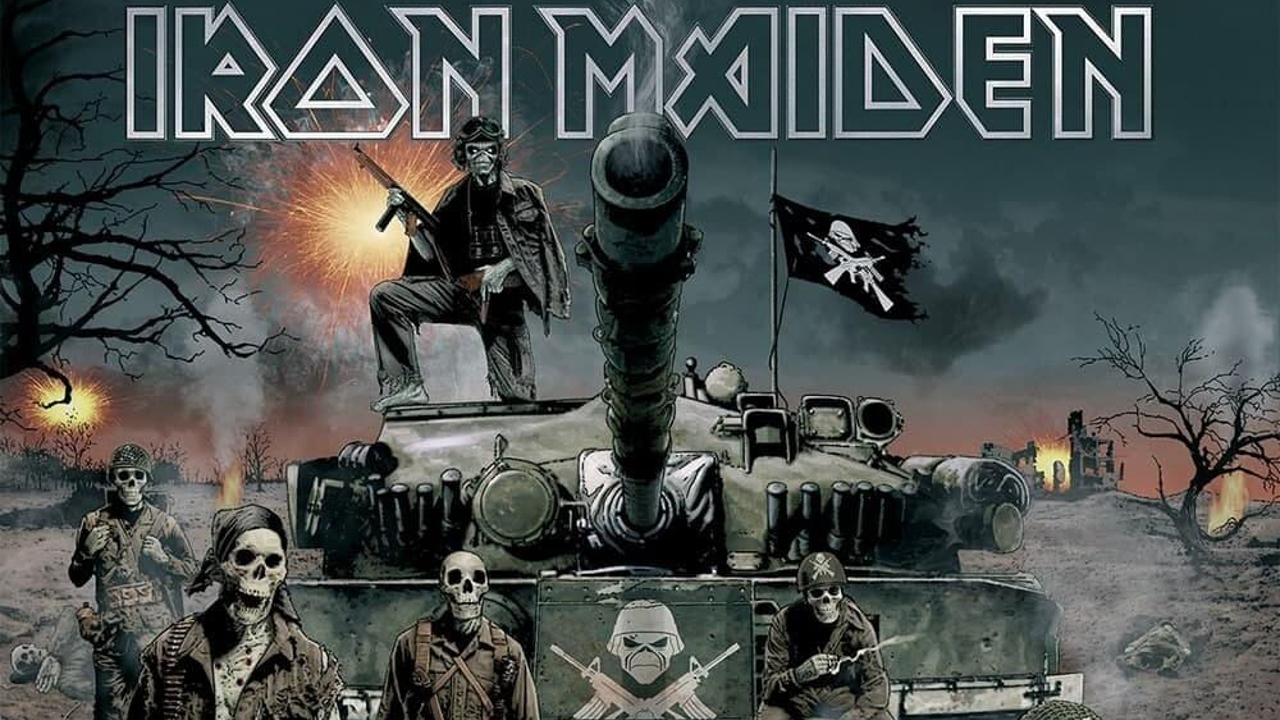“It’s a throwback to our roots,” Bruce Dickinson told Classic Rock when asked why Iron Maiden had decided to play A Matter Of Life And Death in full during the band's 2006 world tour. “We thought it would be a really great way of differentiating ourselves from the pack, and making a big statement about how vital it is that we do new music. It’s just so important that you do stuff you believe in, and keep everything alive. Otherwise there’s no point in doing it."
Maiden's supreme confidence in their fourteenth studio album was justified. A near-flawless, dark and heavy, progressively-minded behemoth, it was awarded a perfect 10/10 by Metal Hammer and a 9 by Classic Rock, who hailed it as the band's best album "since the 80s." With over half its ten tracks running at over six minutes (three of which hung around the nine minute mark), it also marked the strongest indication yet that Maiden were firmly into a stage of their career where they were more interested in crafting expansive, layered epics than smashing out galloping, four or five-minute heavy metal bangers.
Signs of Maiden's iron-clad belief in A Matter Of Life And Death were there from the beginning. The recording of the album bore all the hallmarks of a band high on confidence, Dickinson noting to Hammer that, despite the album's epic scope, the sextet "finished the record with two months to spare", adding that many of the songs that ended up on A Matter Of Life And Death were "first time takes". The band even took the unusual decision not to properly master the record, believing that a "raw" sound would most accurately represent the organic seamlessness of the recording process.
Understandably, reactions to Maiden's decision to play the album in full were mixed. Younger fans and those embracing what was becoming a second golden age for the metal legends were into the idea. Others keen to see the band just roll out the classics or unearth rare cuts from their back catalogue? Decidedly less impressed. "They should all know by now that this is what we’re going to do," stated Dickinson defiantly. "And they can always sell their tickets to someone else, because there’s plenty of people who want them. That really is our attitude." "It’s a special occasion," added guitarist Dave Murray. "Hopefully in the future people will say: ‘I was there when Iron Maiden played the whole of A Matter Of Life And Death.’”
Undeterred by the naysayers, Maiden played A Matter Of Life And Death in full no fewer than 44 times as they toured North America, Asia and Europe across the latter part of 2006. Even the following year, when the tour picked up with added Number Of The Beast songs to celebrate that album's 25th anniversary, they still played five tracks from their newest record. "We’re very proud of our history but we’re also very proud of the new album," stated guitarist Janick Gers. "There comes a point where we have to say: this is where we’re at now. You either stagnate or you try to push forward.” The tour also featured one of the most unique and memorable Eddies ever, popping up, binoculars equipped, from a giant tank that was rolled on stage during Iron Maiden.
In an era where many veteran rock and metal bands increasingly rely on past glories, you can't help but marvel at Maiden's determination to stick by their modern material (you only need look at this year's epic Download performance, where the band opened with three cuts from most recent album Senjutsu, to see that that particular ethos is still very much intact). In the case of A Matter Of Life And Death, it'd be easy to write off their stubborn belief in that record as ego were it not for the fact that the album itself holds up so spectacularly.
From top to bottom, it's a world class record. Opening with the breezy, gung ho Different World, A Matter Of Life And Death really sets out its stall with the two tracks that follow: the defiant These Colours Don't Run, inspired by a brilliant piece of ad-libbing from Dickinson during their infamous run-in with Sharon Osbourne at Ozzfest 2005, and Brighter Than A Thousand Suns, a dark, dramatic epic that flies close to nine minutes.
From there on in the hits keep coming. The Pilgrim is a taught and frenetic rager; the imperious and marching The Longest Day bursts into one of Maiden's most searing post-2000 choruses; Out Of The Shadows is classic, swaying Maiden at their anthemic best. The Reincarnation Of Benjamin Breeg is a brooding, angry tale of a fictional character who may have dabbled a little too heavily with the occult. If you needed any more evidence of Maiden's stubbornness around this time, they released the song as the album's lead single despite knowing it'd be ineligible to chart in the UK due to its seven minutes-plus runtime. Needless to say, it remains Maiden's most unique and decidedly un-single-y single ever.
For The Greater Good Of God is probably the album's pinnacle: the longest song on the record, it's a desperately affecting, emotional rally against the futility of war and religion's influence within it. Today, it's comfortably the most streamed song on the album, and it's perhaps no surprise that when Maiden decided to dig into A Matter Of Life And Death when creating the setlist for the Legacy Of The Beast tour, they turned to it.
The album is capped off with Lord Of Light, a track whose eerie, tip-toeing opening gives way to a histrionic injection or pace and bluster, and The Legacy, a nine-minute beast that journeys from medieval campfire balladry to stomping riffs and a final flurry of classic Maiden galloping heroism.
Over a decade and a half on, it's hard to find a single chink in A Matter Of Life And Death's armour. Of all Maiden's post-2000 offerings, it's the album that managed to push their songwriting forwards and feel ambitious while remaining self-contained and atmospherically consistent. For fans and band alike, the record remains a particular high point of the band's latter years. Only last year, in fact, Bruce Dickinson brought up A Matter Of Life And Death when discussing Senjutsu, noting, "A Matter Of Life And Death was really good. I’ve gone back and revisited it a little bit, and I thought, ‘Shit, that was a really good album.’"
We'd go one further: A Matter Of Life And Death isn't just a really good album. It's a modern classic. And best of all? We can say we were there when it was played in full.

